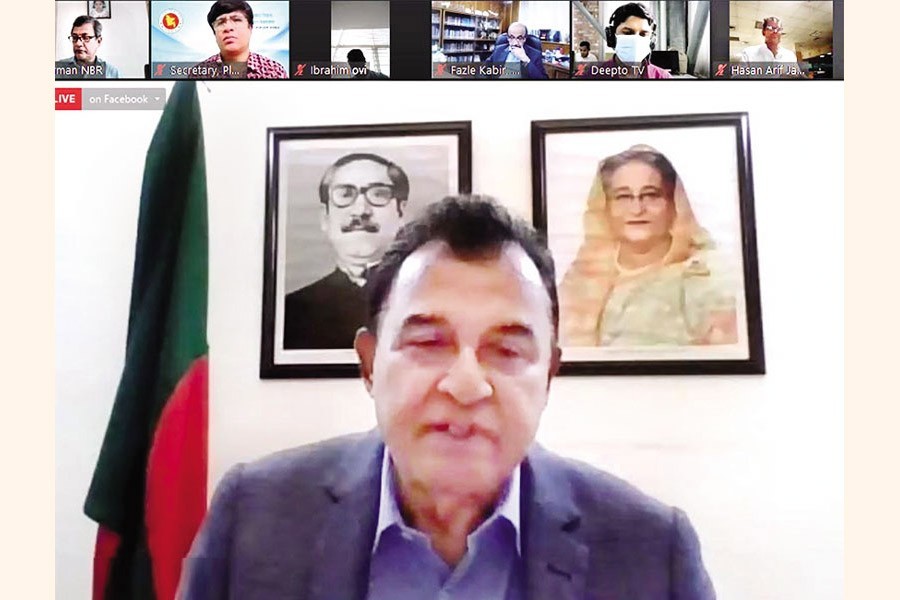Finance Minister AHM Mustafa Kamal has said the government is pursuing an expansionary fiscal policy with an eye to boosting economic growth.
"We're pursuing an expansionary fiscal policy and Bangladesh's debt as a ratio of GDP (gross domestic product) still remained around 40 per cent."
Mr Kamal said this while addressing a virtual post-budget press briefing on Friday afternoon.
Spending is meant for generating income, he argued. "If there is no spending, it implies that there is no investment."
According to Mr Kamal, almost all countries are now widening deficit to meet budget expenditure in the wake of the ongoing coronavirus pandemic.
He placed in parliament a Tk 6.03-trillion budget for fiscal year 2021-22 on Thursday, keeping 6.2-per cent deficit which usually follows a thumb rule of 5.0 per cent of the GDP.

Bangladesh has a strong foreign-currency reserve, he said, adding that the reserve was just $32.7 billion on June 30, 2019. But it now passes $45.0 billion.
Mr Kamal said the tax rate has been kept somewhat 'flexible' and this is meant for generating more revenue.
Planning minister MA Mannan, who also joined the event, said borrowing is not a problem for Bangladesh as all extend their arms for the country.
"We are not loan eaters [he probably meant loan defaulters] and we never misspend the borrowed money," he remarked.
On the vaccination drive, Mr Kamal said the government wants to inoculate all people. "We'll do that job and it's not possible by giving a deadline."
On the other hand, Abdur Rouf Talukder, senior secretary at finance division, said the budgetary allocation for health ministry has widened.
"The allocation was increased by 13.3 per cent for the next fiscal," he said in reply to a media query pertaining to the topic.
Mr Talukder said: "We've allocated Tk 142 billion to purchase vaccines. We'll give more, if necessary."
"There's a mismatch," he said as he implied the problem of buying goods and services by health ministry.
The secretary said the purchases are supply side-based, but plan is afoot to create it on a demand basis.
There is another problem in the procurement of health department, he said, adding: "They lack experienced people to manage purchases."
They contemplate a crash programme for the ministry.
Citing a press bite on Friday, agriculture minister Dr Abdur Razzaque said: "I've gone through each and every newspaper but frustrated as all the outlets cited health ministry's budget inadequate."
"Resources are not a problem in Bangladesh as it has a variant economy," he commented.
Dr Razzaque said the allocation earmarked for his own ministry was also adequate. He said Bangladesh wants to make the agri sector mechanised and also seeks to launch commercial farms.
Echoing Mr Kamal's expansionary policy stance, central bank governor Fazle Kabir said Bangladesh Bank would also pursue a similar monetary policy to support growth, create employment and raise the demand.
Refuting allegations of engulfing a stimulus package by big corporate houses, he said more than 96,000 small businesses were the beneficiaries of the Tk 200-billion package meant for CMSMEs.
"Of the Tk 400-billion package for big corporate houses," Mr Kabir said, "82 per cent has already been disbursed."
About government borrowing, he said the banking system has adequate liquidity. The government wants Tk 764.5 billion from the banking system in fiscal year 2021-22.
The governor said the banking system has now Tk 2.0-trillion liquidity, including investments by banks. "We have more than Tk 400 billion cash liquidity now."
The government has been implementing 23 stimulus packages having Tk 1.28 trillion as part of supporting the virus-affected enterprises and individuals.
The banking channel has been providing Tk 900 billion or 70 per cent of the total package and the rest is being borne by the government.
"We're paying Tk 45.0 billion in interest from budget," said Mr Talukder.
The top official of the finance division said the package would continue until its full disbursement.
PM's economic affairs adviser Dr Mashiur Rahman, National Board of Revenue chairman Rahmatul Muneem, ERD secretary Fatima Yasmin and other high government officials were also virtually present.


